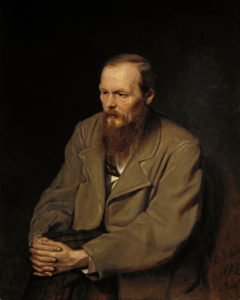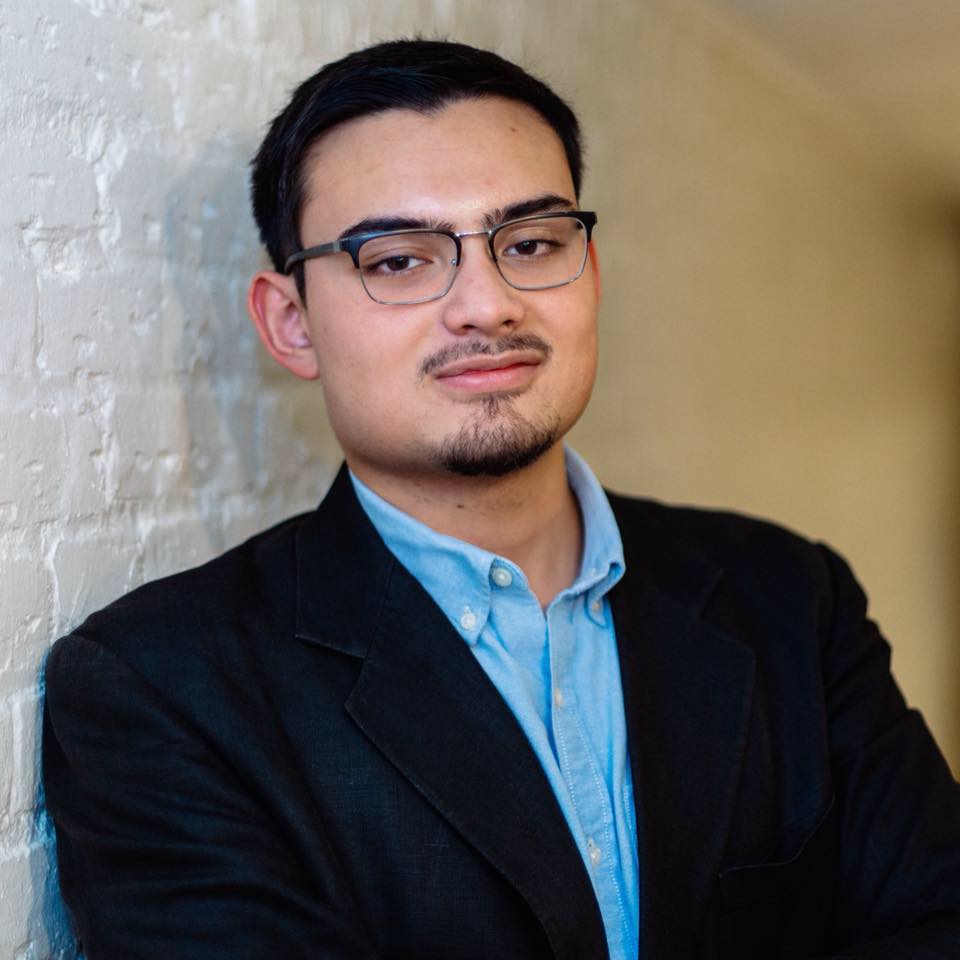Winston Churchill famously stated that Russia “is a riddle wrapped in a mystery inside an enigma.” While reading Fyodor Dostoevsky’s The Brothers Karamazov and Demons, I arrived at the same conclusion, thoroughly perplexed by Dostoevsky’s use of the phrase “Russian God.” What does Dostoevsky’s peculiar notion of Russian God mean? In Christendom, God is personal, loves all men, and sent his son to die not for the salvation of a singular nation but all mankind. Analysis of Dostoevsky’s Demons and The Brothers Karamazov indicates that Dostoevsky’s concept of Russian God is a uniquely Russian entity that diverges from biblically orthodox conceptions of God and faith. Underpinned by Russian nationalism, anti-Westernism, and Russian imperial doctrine, Dostoevsky’s Russian God notion emphasizes tribalism over Christian theological orthodoxy and is a footnote in the long history of state manipulation of religion in Russia.
Dostoevsky helps readers understand the complex relationship between Russian nationalism and Russian Orthodoxy because his Russian God concept is underpinned by Imperial Russia’s “Official Nationality” doctrine and sobornost’. Official Nationality was the Russian Empire’s main ideological doctrine during the reigns of Tsars Nicholas I and Alexander III. It combined three elements—Russian Orthodoxy, Russian Nationality, and autocracy—into a single conservative Russian imperial ideology that called for Russification, pan-Slavism, and anti-Westernism.

Sobornost’ is an abstract Russian religious concept that was first articulated by Slavophilic thinker Alexei Khomiakov. It is a living community of believers that exists within the church and binds all together in Russian Orthodox faith. Sobornost’s community is explicitly exclusionary of Catholics, Protestants, and other Western denominations perceived as corrupt. According to Russian philosophy scholar Elena Besschetnova, “Khomiakov played a huge role in the formation of the Russian national identity, in the formation of the ‘Russian spirit’ and ‘Russian thought,’ giving to it religious connotation and its own special direction.” Sobornost’ thus has a relationship with Official Nationality and Russian chauvinism through its linkages to Russia’s exclusionary religious identity.
In Demons, Russian God is mentioned from the perspective of morally flawed characters. Demons’ first mention of Russian God occurs when Stepan Tromfimovich is introduced to the reader as a man who lives in “a hotbed of freethinking, depravity, and godlessness,” who enjoys drinking champagne and bloviating liberal thoughts about the “‘Russian spirit,’ about God in general and the ‘Russian God’ in particular; for the hundredth time repeating scandalous Russian anecdotes known to everyone and repeated to everyone” (p. 33-34).
Tromfimovich is depicted as a good-for-nothing liberal, whose alcohol-induced banal ramblings on the supposed true nature of Russia, the Russian spirit, and Russian God, ultimately cause more harm than anything else, considering that he is partly to blame for the revolutionary ideas that fuel the destruction that occurs in the novel. Significantly, freethinking and Westernization are equivocated with atheism and degeneracy, reasoning characteristic of Official Nationality.
Demons’ next mention of Russian God occurs when Petr Stepanovich speaks with Semyon Karmazinov, a nihilist whose character serves as Dostoevsky’s literary caricature of Ivan Turgenev.[1] Karmazinov’s nihilism is evident when he states:
Holy Russia is least capable in all the world of resisting anything. Simple people still hang on somehow by the Russian God; but the Russian God, according to the latest reports, is rather unreliable and even barely managed to withstand the peasant reform … No, I don’t believe in the Russian God at all. (p. 370)
Seeking clarification, Petr Verkhovensky immediately asks Karmazinov whether he believes in “European [God]” (p. 370), to which Karmazinov unambiguously replies: “I don’t believe in any” (p. 370). This dialogue is telling with regards to Russian religious identity, as it implies that Russian God and “European God” are distinctly different conceptual entities.
While Demons provides no explicit definitions or qualifying characteristics of either the Russian or European God, the quality of their being separate is both significant and utterly unbiblical. The Russian Orthodox monks in The Brothers Karamazov provide some insight to Russian God, in that Russian God should not be simply associated with Eastern Orthodoxy or Byzantine Rite. The monks chastise Constantinople’s leadership, saying:
We stick to the old ways, who cares what innovations they come up with; should we copy them all? … We’ve had as many holy fathers as they have. They sit there under the Turks and have forgotten everything. Their Orthodoxy has long been clouded. (p. 333)
Thus, Russian God should not be interpreted as an Eastern Orthodox concept in general, but specifically as a Russian Orthodox entity. This indicates Russian nationalism consistent with Official Nationality.
For Dostoevsky, the debate about faith in The Brothers Karamazov is not as simplistic as atheism versus theism, but rather a belief in the God of Russian Orthodoxy, complete with its themes of sobornost’ and political linkages to Russian nationalism and autocracy, versus anything else. Dostoevsky’s Russian God is incompatible with ecumenical fellowship through Christ, and proper religious observance is only preserved through identification and division of ingroups and outgroups on extra-theological grounds. In The Brothers Karamazov, this is evident in how Catholicism is lampooned in “The Grand Inquisitor,” Rome is described as “the third temptation of the devil” (p. 66), Pavel Smerdyakov, who is not entirely an atheist, has a corrupted faith which is described as “not Russian at all” (p. 131), Ivan Karamazov, who also is not a complete atheist, is similarly criticized for being a “stinking Jesuit” (p. 130), and the Ecumenical Patriarchate’s leadership in Constantinople is branded as illegitimate by Russian monks who describe it as “clouded” by Turkish influence (p. 333).
The negative effects of undermining of sobornost’ are central in Dostoevsky’s novels. This is especially prevalent in Demons, where liberal characters’ ridicule of Holy Russia, Russian culture, and Russian God, combined with praise of institutional reforms such as the new criminal courts with trial by jury (as opposed to the previous more autocratic system), demonstrates how deviation from Official Nationality’s three tenants of Orthodoxy, nationality, and autocracy leads to death and destruction. Thus, failure to adhere to sobornost’ destabilizes, and governmental reform and liberal attitudes destroy.
In both novels Dostoevsky uses Russian God to refer not to European, or Western God, but to unique aspects of Russian Orthodoxy with its unique emphasis on sobornost’. The Brothers Karamazov’s single reference to Russian God demonstrates the sincerity of Dmitry Karamazov’s character transformation when he exclaims his love for Russia and Russian God in the epilogue. Unfortunately for Dostoevsky, sobornost’s nationalistic and exclusionary premises contradict biblical teaching. Thus, Dostoevsky’s Russian God notion is an amalgamation of Russian nationalism, autocracy apologia, and sobornost’.
Dostoevsky’s Russian God concept is instrumental for a holistic understanding of Russian religious identity, which is best understood through the historical nexus of Russian Orthodoxy, nationalism, and autocracy that was characteristic of Russia for most of the nineteenth century and increasingly characteristic of Russia today. While Dostoevsky may not have been a good theologian or a doctrinally sound Christian, his works speak volumes of truth about Russia’s idiosyncratic attitudes toward faith, God, community, and the dangers of foreign influences on “Holy Russia.”
Works Cited:
Besschetnova, Elena. “Alexei Khomiakov: We Are Sobornost,’” Benedictine Abbey in Tyniec. Krakow, Poland. 2017. Web
Dostoevsky, Fyodor. Translated by Richard Pevear and Larissa Volokhonsky. Demons. New York: Vintage Books. 1994. Print.
Dostoevsky,
Fyodor. Translated by Richard Pevear and Larissa Volokhonsky. The Brothers Karamazov. New York:
Farrar, Straus and Giroux. 2002. Print.
[1] Ivan Turgenev was famous for his proto-Nihilist novel, Fathers and Sons. For more analysis on the literary relationship between Turgenev and Karmazinov see Frank, Joseph, and Mary Petrusewicz. Dostoevsky : A Writer in His Time / Joseph Frank ; Edited by Mary Petrusewicz. Princeton: Princeton UP, 2010. Print. pp. 642–5.






